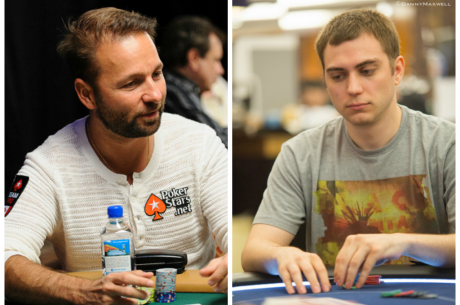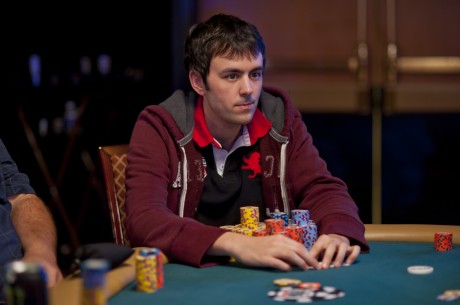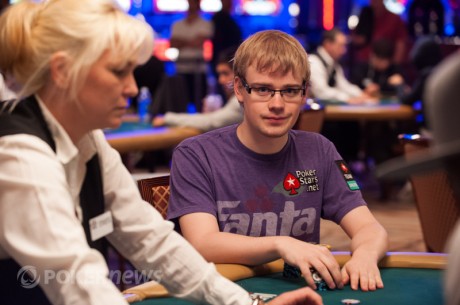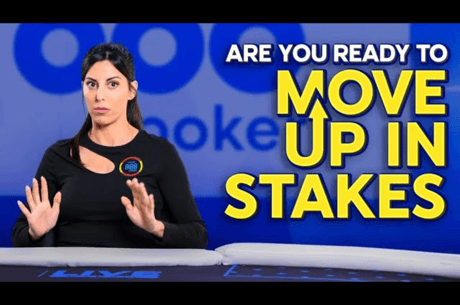Hold��em with Holloway, Vol. 1: Making Reads and Trusting Them
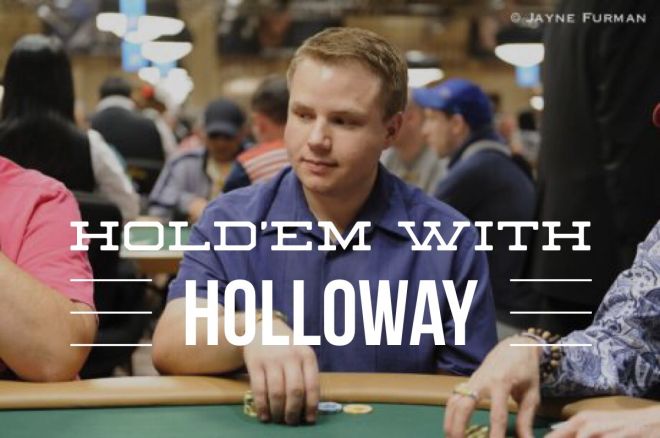
I am not a poker professional. I make a living as a Senior News Editor for PokerNews and other freelance writing gigs. That said, I do consider myself a semi-pro as I spend a great deal of my free time supplementing my income by playing poker, be it in cash games or tournaments. At the 2013 World Series of Poker, I was even fortunate enough to win Event #1: $500 Casino Employees No-Limit Hold��em for a gold bracelet and $84,915 in prize money.
Thanks in part to that success, PokerNews has asked me to write a weekly strategy column called Hold��em with Holloway, though I intend on discussing pot-limit Omaha and other games from time to time. So what all can you expect from this column moving forward?
My goal is to share with you my poker journey as I strive for even more poker glory. My usual games, which are all played live, include $1/$2 to $5/$10 no-limit hold��em and pot-limit Omaha, and tournaments ranging from $50 buy-ins up to $1,500. From time to time I find myself playing other games, and I've been known to take some shots in $40/$80 H.O.R.S.E. and both $5,000 and $10,000 buy-in tournaments. If you play at similar stakes, then you may find value in this column. If you��re primarily an online player, have a strong mathematical background, or are all about technicalities, well let's just say I am a layman and will be writing as such.
I��ll also be the first to admit that the things I write about in this column aren��t always going to be right, and if you disagree with what I say or have another option for my rationale, hopefully you��ll share your opinion. Truthfully, I hope to learn and improve my game through interactions with you, the reader. So please, if you have something to say, leave a comment below and let's have a discussion.
Making a Read and Trusting It
In this inaugural Hold��em with Holloway piece, I want to discuss an interesting hand that took place in a $65 buy-in qualifier for the Mid-States Poker Tour (MSPT). The tournament awards the top 20 percent of the field seats into $250 qualifiers, which then advance the top 20 percent from that tournament to the main event. On this particular evening, there were 31 entries, meaning six seats were up for grabs.
Players began the qualifier with 10,000 in chips and played 20-minute levels starting with the blinds at 100/100. In Level 2 (100/200), I was down to about 7,000 when a gentleman named Lester limped under the gun. I looked down at Ax10x-offsuit and decided to limp as well. This inspired five other players to limp behind, including a buddy of mine named Derek. When action reached a short-stacked player in the big blind, he opted to move all in for 3,000. Lester, who had 3,100 total, kind of shrugged and made some sort of comment akin to ��Let��s gamble.��
This may seem like an easy fold, but my read on the hand suggested otherwise. I had played a lot with Lester in the past, and while his under-the-gun limp might signal strength to most, I learned over the years his comment was a sure sign of weakness. I was highly confident he had meager holdings and was just getting it in either to double or reenter. Likewise, the big blind seemed to be on tilt and shoving light, such as any ace down to queen-jack. I really thought my ace-ten was out in front of them both, but there were still five limpers behind me.
Calling wasn't really an option, but I thought an all-in shove would encourage all the limpers to fold. After all, if any of them had better than ace-ten, wouldn��t they have raised? Even if they did have better, say ace-jack or a small pocket pair, chances are they would fold to so much action. I shoved and hoped they read my early-position limp as strength.
One by one my opponents folded back to Derek, who had limped from the button. He barely had me covered, and he hemmed and hawed before calling. Based on his holding, I assume he was ready to rebuy.
Derek: K?J?
Lester: J?9?
Myself: A?10?
Big Blind: A?5?
I was surprised that Derek called so light, but I was thrilled to see I was ahead (is there any better feeling than having your read validated?). Even so, according to the PokerNews Odds Calculator I only had 27 percent chance of winning the hand, which put me on par with both Lester and Derek, while the big blind would come from behind just 14 percent of the time.
The A?10?9? flop gave me two pair, but it put out both straight and flush draws for my opponents. Long story short, the river gave both Derek and Lester a jack-high straight and I was out. I reentered, but my second bullet proved no more fruitful than the first. I failed to win a qualifier seat.
In hindsight I probably should have folded the hand and moved on to the next one, but this could be considered results-oriented thinking. Still, I think it��s important to make reads and trust in them. Unfortunately, even if you��re right, it doesn��t always mean you��re going to win. The key is to take solace in the fact that your poker radar is spot on.
Do not be results oriented. Keep making good reads, trust in them, and I guarantee they��ll pay off in the long run.
As for me, I��ll continue to play these qualifiers as I hope to win my way into the MSPT Running Aces and Ho-Chunk Gaming Wisconsin Dells stops, both of which are coming up later this month. Even if I don��t, I will likely buy in directly, so you can be sure that I��ll be covering those in future editions of Hold��em with Holloway.
Get all the latest PokerNews updates on your social media outlets. Follow us on Twitter and find us on both Facebook and Google+!
In this Series
- 1 Hold��em with Holloway, Vol. 1: Making Reads and Trusting Them
- 2 Hold��em with Holloway, Vol. 2: Playing in Poker Charity Events
- 3 Hold��em with Holloway, Vol. 3: Throttle Back Before You End Up Punting
- 4 Hold��em with Holloway, Vol. 4: Punish the Satellite Bubble
- 5 Hold��em with Holloway, Vol. 5: What is Proper Accumulator Strategy?
- 6 Hold��em with Holloway, Vol. 6: A Chip and a Chair Story with ��SirWatts��
- 7 Hold��em with Holloway, Vol. 7: 15 Things About Poker I Wish I��d Known Sooner
- 8 Hold��em with Holloway, Vol. 8: Examining the Largest Overlay in Poker History
- 9 Hold��em with Holloway, Vol. 9: Differences Between Rebuys and Reentries
- 10 Hold��em with Holloway, Vol. 10: Five Must-Read Poker Books of 2014
- 11 Hold��em with Holloway, Vol. 11: When Will You Finally Break Through?
- 12 Hold��em with Holloway, Vol. 12: Dealing with a Target on Your Back
- 13 Hold��em with Holloway, Vol. 13: Knowing When to Call It Quits
- 14 Hold��em with Holloway, Vol. 14: Embarking on a Year-Long Weight Loss Journey
- 15 Hold��em with Holloway, Vol. 15: Navigating Multiple Decision Points in a Poker Hand
- 16 Hold��em with Holloway, Vol. 16: Chris Moorman Tells Me How Badly I Play Poker
- 17 Hold��em with Holloway, Vol. 17: Richard ��nutsinho�� Lyndaker on Getting It in Marginal
- 18 Hold��em with Holloway, Vol. 18: Getting Inside the Head of Poker Pro Brian Rast
- 19 Hold��em with Holloway, Vol. 19: Stupid Calls & Lucky Draws in MSPT WI Championship
- 20 Hold��em with Holloway, Vol. 20: Talking Ante-Only Strategy with Greg ��FossilMan�� Raymer
- 21 Hold��em with Holloway, Vol. 21: Contributing to Jonathan Little��s New Book
- 22 Hold��em with Holloway, Vol. 22: Consequences of Acting Out of Turn & Tossing in Chips
- 23 Hold��em with Holloway, Vol. 23: When It Comes to Chops, Do What��s In Your Best Interest
- 24 Hold��em with Holloway, Vol. 24: Accepting Bad Beats & Lessons in Selling Action
- 25 Hold��em with Holloway, Vol. 25: Heinz�� Ace-High Call Shows Why He's a World Champ
- 26 Hold��em with Holloway, Vol. 26: Is Keeping the Short Stack Alive Collusion?
- 27 Hold��em with Holloway, Vol. 27: Great Laydown or Bad Fold on Poker Night in America?
- 28 Hold��em with Holloway, Vol. 28: Calling Hellmuth with Jack-Deuce Offsuit
- 29 Hold��em with Holloway, Vol. 29: The Philosophy of "No-Chop" Chad
- 30 Hold��em with Holloway, Vol. 30: Preparing to Play the World Series of Poker
- 31 Hold��em with Holloway, Vol. 31: Staying on Your Grind at the World Series of Poker
- 32 Hold��em with Holloway, Vol. 32: The Perilous Decision to Call Off with Ace-Queen
- 33 Hold��em with Holloway, Vol. 33: Using Poker Skills in Reality TV Competitions
- 34 Hold��em with Holloway, Vol. 34: Esfandiari Explains How to Recover from Bad Beats
- 35 Hold��em with Holloway, Vol. 35: Tilly vs. Brunson in Super High Roller Cash Game Hand
- 36 Hold��em with Holloway, Vol 36: Unconventional Play Leads to Good WSOP Main Event Start
- 37 Hold��em with Holloway, Vol. 37: Lessons in Pot-Limit Omaha Hi-Low w/ Evan Jarvis
- 38 Hold��em with Holloway, Vol. 38: Things to Say and Do When You Bust a Poker Tournament
- 39 Hold��em with Holloway, Vol. 39: How Much Did I Have to Raise to Get You to Fold?
- 40 Hold��em with Holloway, Vol. 40: Practicing Patience in My Deep PPC Poker Tour Run
- 41 Hold��em with Holloway, Vol. 41: Analyzing a Questionable SHRPO Main Event Hand
- 42 Hold��em with Holloway, Vol. 42: Analyzing the Play of Neymar Jr. at EPT Barcelona
- 43 Hold��em with Holloway, Vol. 43: The Value of a Reliable Poker Reputation
- 44 Hold��em with Holloway, Vol. 44: John ��KasinoKrime�� Beauprez Rips My PLO Game Apart
- 45 Hold��em with Holloway, Vol. 45: Satellite Dilemmas -- To Call or Not to Call
- 46 Hold��em with Holloway, Vol. 46: Seiver Leverages the River in Super High Roller Bowl
- 47 Hold��em with Holloway, Vol. 47: What Untraditional Moves in Poker Might Mean
- 48 Hold��em with Holloway, Vol. 48: Thinking About the Future with Sam Grizzle
- 49 Hold��em with Holloway, Vol. 49: WCOOP Champ ��Coenaldinho7�� Offers Up His Biggest Hands
- 50 Hold��em with Holloway, Vol. 50: The Peril of Shoving Weak Aces
- 51 Hold��em with Holloway, Vol. 51: The Importance of Not Giving Up in Poker Tournaments
- 52 Hold��em with Holloway, Vol. 52: Does Asking ��Check�� Actually Constitute a Check?
- 53 Hold��em with Holloway, Vol. 53: Thomas Cannuli Impresses Even After Main Event Bustout
- 54 Hold��em with Holloway, Vol. 54: Dealers Aren��t Always Right
- 55 Hold��em with Holloway, Vol. 55: Don��t Get Married to Pocket Aces
- 56 Hold��em with Holloway, Vol. 56: Bazeley��s Survival Instinct Leads to Continued Success
- 57 Hold��em with Holloway, Vol. 57: Playing ��Deuces Wild�� on the European Poker Tour
- 58 Hold��em with Holloway, Vol. 58: The Wildest Hand in European Poker Tour History
- 59 Hold��em with Holloway, Vol. 59: Death, Zombies & Spending Time w/Phil Hellmuth
- 60 Hold��em with Holloway, Vol. 60: How the Unstoppable Fedor Holz Managed to Win Again
- 61 Hold��em with Holloway, Vol. 61: Lessons To Be Learned When You Hit the Big Stage
- 62 Hold��em with Holloway, Vol. 62: Steve O��Dwyer Explains the ��Oreo Cookie Tell��
- 63 Hold��em with Holloway, Vol. 63: What Would Happen to a Chip Stack If a November Niner Died?
- 64 Hold��em with Holloway, Vol. 64: Forgetting One Chip -- Should It Still Be an All-In Bet?
- 65 Hold��em with Holloway, Vol. 65: Todd ��sharkslayerrr�� Breyfogle on Bankroll Management
- 66 Hold��em with Holloway, Vol. 66: Cash Game Pro Daniel Arfin Offers Sound Bankroll Advice
- 67 Hold��em with Holloway, Vol. 67: Honeyman Plays Kings to Keep in Opponent��s Bluff Range
- 68 Hold��em with Holloway, Vol. 68: Why Do I Even Bother Drinking at the Poker Table?
- 69 Hold��em with Holloway, Vol. 69: Is Your Favorite Poker Pro Left- or Right-Handed?
- 70 Hold��em with Holloway, Vol. 70: In Order to Live You Have to Be Willing to Die
- 71 Hold��em with Holloway, Vol. 71: How to Amass a Big Stack Early in a Poker Tournament
- 72 Hold��em with Holloway, Vol. 72: Answering User-Submitted Poker Scenarios
- 73 Hold��em with Holloway, Vol. 73: Saying Goodbye with a Top Five List
- 74 Hold'em with Holloway, Vol. 74: We're Back, Baby!
- 75 Hold'em with Holloway, Vol. 75: Jivkov on Exploiting Capped Ranges
- 76 Hold��em with Holloway, Vol. 76: Matt Bretzfield Gets Tricky With Aces
- 77 Hold'em with Holloway, Vol. 77: Joseph Cheong Gets Crazy with a Pair of Ladies
- 78 Hold'em with Holloway, Vol. 78: Wyoming Poker Action & Wild South Dakota Hand
- 79 Hold'em with Holloway, Vol. 79: Calling Controversy at WinStar
- 80 Hold'em with Holloway, Vol. 80: Going for Value with Matt Hunt
- 81 Hold'em with Holloway, Vol. 81: Bracelet Winner Ryan Leng on Bad Call
- 82 Hold'em with Holloway, Vol. 82: Romeopro33 Recounts XL Eclipse Victory
- 83 Hold'em with Holloway, Vol. 83: Men The Master Doesn't Get Paid
- 84 Hold'em with Holloway, Vol. 84: Harman Hits Back-to-Back Miracle Turns
- 85 Hold'em with Holloway, Vol. 85: Jamie Kerstetter on Dealing with Bounties
- 86 Hold'em with Holloway, Vol. 86: Matt Stout Develops a Limp Dynamic
- 87 Hold'em with Holloway, Vol. 87: Matt Alexander Caught in Between w/ Two Red Aces
- 88 Hold'em with Holloway, Vol. 88: John Beauprez on Why He Folded a Set of Jacks
- 89 Hold'em with Holloway, Vol. 89: Alex Aqel Lets Opponent Hang Himself with Aces
- 90 Hold'em with Holloway, Vol. 90: David Peters Makes Beastly Call Against Will Givens
- 91 Hold'em with Holloway, Vol. 91: Poker Lessons from a Game of Risk
- 92 Hold'em with Holloway, Vol. 92: My Upstuck Diagnosis by the CLC Squad
- 93 Hold'em with Holloway, Vol. 93: Alex Foxen Coolers Nick Petrangelo in SHRB
- 94 Hold'em with Holloway, Vol. 94: My $25,000 PSPC Experience at 2019 PCA
- 95 Hold'em with Holloway, Vol. 95: The Equity of Leveraging Time Extensions
- 96 Hold'em with Holloway, Vol. 96: Dan O'Brien on Developing Healthy Routines
- 97 Hold'em with Holloway, Vol. 97: Big Hands From the WSOP-C Potawatomi
- 98 Hold'em with Holloway, Vol. 98: Simon Deadman Rips Apart My NLH Tourney Play
- 99 Hold'em with Holloway, Vol. 99: Shoving 10-6 Smack Dab Into Pocket Aces
- 100 Hold'em with Holloway, Vol. 100: The Revived Re-Entries Debate

